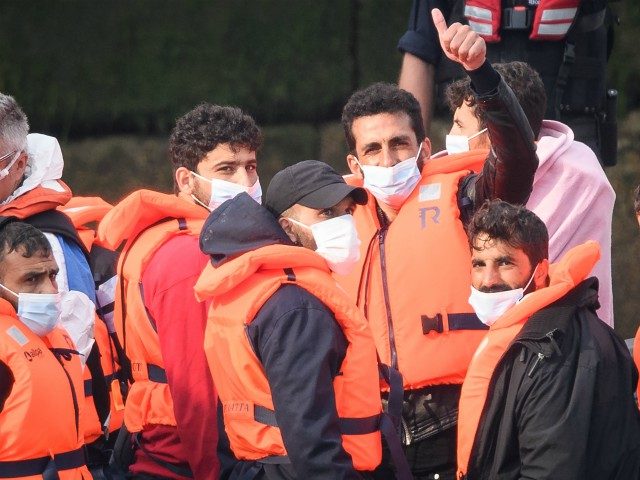The UN Refugee Agency and the International Organization for Migration (IOM) have told the UK not to use the navy to repel illegal boat migrants coming from France, claiming that Britain can cope with the constant stream of new arrivals because numbers are “low”.
More than 4,500 illegals have crossed the English Channel and landed on Britain’s shores in the first eight months of 2020 — more than double the 1,890 who arrived in the whole of 2019.
Last week, the British government announced that it had asked the military to aid UK Border Force and is considering an Australian-style push-back programme to force boats of illegal migrants back to France.
Not only are the French reportedly playing hardball over accepting back the migrants, but the United Nations High Commissioner for Refugees (UNHCR) and the IOM — which has said that mass migration is “inevitable, desirable, [and] necessary” — are telling the UK not to repel the boats, either.
The bodies claimed in a press release that they were “troubled by the proposal to intercept boats and return those attempting to cross the English Channel irregularly”, alleging it could cause “harmful and fatal incidents”.
“Although increasing numbers of people have been crossing the Channel by boat this summer, the numbers remain low and manageable,” the globalist bodies said, implying that the UK should simply continue to accept the high number of illegal incursions into Britain.
“People forced by wars and persecution to flee their homes and people on the move frequently embark on risky journeys in many parts of the world,” they added.
While the agencies talk of people ‘fleeing’ wars and persecution, migrants who cross from France to the UK travelled through several safe countries in which they should have claimed asylum — including France itself. The UNHCR even admitted in May that 70 per cent of the Mediterranean boat migrants do not qualify for refugee status.
“Our collective response should be comprehensive and complementary — from saving lives to combating smuggling rings, expanding legal options, and ensuring that all those who are in need of protection can effectively access it,” Pascale Moreau, UNHCR Director for Europe, said, effectively ruling out nations’ rights to reinforce their borders and repel illegal aliens.
While UN leaders such as its general-secretary, António Guterres, have claimed that “migration is inevitable and will not stop”, other countries have proved that position wrong.
During the 2015 Europe migrant crisis, Hungary became the gateway between the Balkans and Western Europe for migrants from the Middle East. The government of conservative Prime Minister Viktor Orbán built fences and walls, increased border patrols, and pushed back illegals at the border, reducing the numbers of migrants from 391,000 in 2015 to just 1,184 in 2017.
Australia was also a success story, with its Operation Sovereign Borders. By repelling boats at sea, then-Prime Minister Tony Abbott has reduced the number of migrants from 20,000 a year to zero by 2015. The antipodean country had also come to blows with the United Nations, which has been claiming for years that turning back migrant boats was illegal. However, Australia’s High Court ruled in 2015 that maritime interceptions were legal, setting a precedent for nations worldwide.
Mr Abbott recently gave a word of warning to the UK that unless it got tough on illegal immigration, the nation would suffer its own migrant crisis. He also dispelled the myth that stopping boats was dangerous, pointing out that destroying the smugglers’ business model ultimately saves lives at sea. The method was also proven by then Italian interior minister Matteo Salvini, whose practice of rejecting the boats resulted in a drop in deaths in 2018 as migrants stopped taking the dangerous journey from Africa to Europe.
“This is the fundamental truth that policy makers in Britain need to understand. To stop people from setting out for Britain in unseaworthy boats, you have to ensure that they never arrive; or that if they do arrive they are swiftly sent back. Especially if people setting out for Britain in overloaded dinghies are going to be rescued and taken where they want to go, the boats will keep coming,” Mr Abbott said in June.
“Plainly, this will require a degree of determination and planning on Britain’s part. The French may not like to hear ‘they shall not pass’ from Britons… Still, in the long run, this is for France’s good too; as the only way to clear the camps in Calais is to ensure that none of their occupants can ever get across the Channel and stay,” he added.

COMMENTS
Please let us know if you're having issues with commenting.